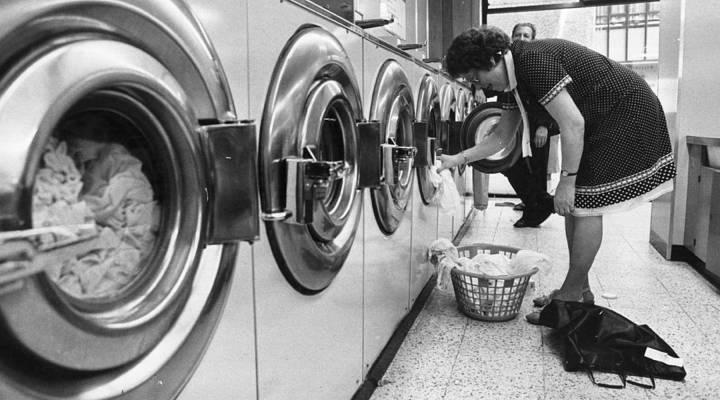
The decline in laundromats shows how US cities are changing
The decline in laundromats shows how US cities are changing

Economic indicators come in all shapes, sizes and appliances. According to the U.S. Census Bureau, the number of laundromats has dropped 20 percent since 2005, especially in densely populated urban areas like Chicago and Los Angeles. Our urban landscape is changing, and according to Oakland-based writer Marc Vartabedian, laudromats tell the story of that change. Vartabedian wrote about the changes in the laundromat industry for “The Atlantic.” Marketplace host Kai Ryssdal spoke with him about his reporting. The following is an edited transcript of their conversation.
Kai Ryssdal: Why are we seeing this decline in laundromats? What’s going on?
Marc Vartabedian: We’re really seeing it focused around big, dense cities that are seeing a sudden influx of wealth. As developers sweep through these previously gritty, dense urban neighborhoods that are dominated by renters, you know, the first thing they do is they put in apartments and housing with washer and dryer hookups.
Ryssdal: This is a little bit of false romanticism, right? But it’s part of a change in this society. I mean, not that hauling your laundry down to the laundromat to get it done for, you know, 10 or 15 bucks is fun, but there’s something to be said for that, you know, the way it’s changing neighborhoods, to not have these places there.
Vartabedian: Laundromats have been a longtime urban staple. And it’s funny, the pop culture depictions of laundromats are very present in a lot of people’s minds. You know, “Seinfeld” spun an episode around the laundromat. There’s a kind of a classic 1985 film called “The Laundromat.” And you’re right. I mean they’re kind of one of the few places where people from very different walks of life get thrust together. And, you know, I think losing that, sure, there’s maybe a bit of false nostalgia about it.
Ryssdal: Not to get all personal finance about this, but washing your laundry in the laundromat can get expensive. You got a family of four or five, and it’s probably a hundred bucks.
Vartabedian: Yeah, a lot of the laundromats around here, you know, you’re looking at $4.50 to $5 a wash. And if you’ve got a big family, that’s over $100 a month, easy.
Ryssdal: Is that $4.50 or $5, wash and dry? Or is it five bucks to wash, five bucks to dry? As you can tell, I haven’t been in a good, long while.
Vartabedian: That’s $4.50 to $5 just for the wash. Drying is usually a bit cheaper, but still, that adds up.
Ryssdal: Some of these laundromat owners, you say in this piece, are, if they can’t sort of turn their buildings into something else, they’re dressing up the laundromats themselves, right? They’re doing Wi-Fi, and all kinds of different things.
Vartabedian: Yeah, there’s this movement to make the laundromat more hip, which is kind of funny in itself. The coin laundry industry, they have a conference every other year in Las Vegas, and one of the talking points this year was, you know, how can we make laundromats more appealing to young people where they want to hang out and meet other people. And so they’re trying to flip the script on the laundromat. You know, it’s kind of been viewed as this downtrodden eyesore within the community, and the industry is kind of trying to shift that image.
Ryssdal: It has to be said here that there are people in this economy who need the laundromat, whose landlords are not going to put in the plumbing and electrical fixtures to get in washers and dryers, and who depend on these places that are now going away.
Vartabedian: The numbers are shrinking, particularly in neighborhoods that are seeing an influx of wealth. But sure, there’s still tons of people that depend on laundromats. So that demand will still be there, I think, and, you know, some of the people that I talked to said laundromats closing in their community makes them have to work harder to do their laundry. They’re got to walk further, and they maybe have to go to a more expensive one, that kind of thing.
There’s a lot happening in the world. Through it all, Marketplace is here for you.
You rely on Marketplace to break down the world’s events and tell you how it affects you in a fact-based, approachable way. We rely on your financial support to keep making that possible.
Your donation today powers the independent journalism that you rely on. For just $5/month, you can help sustain Marketplace so we can keep reporting on the things that matter to you.


















